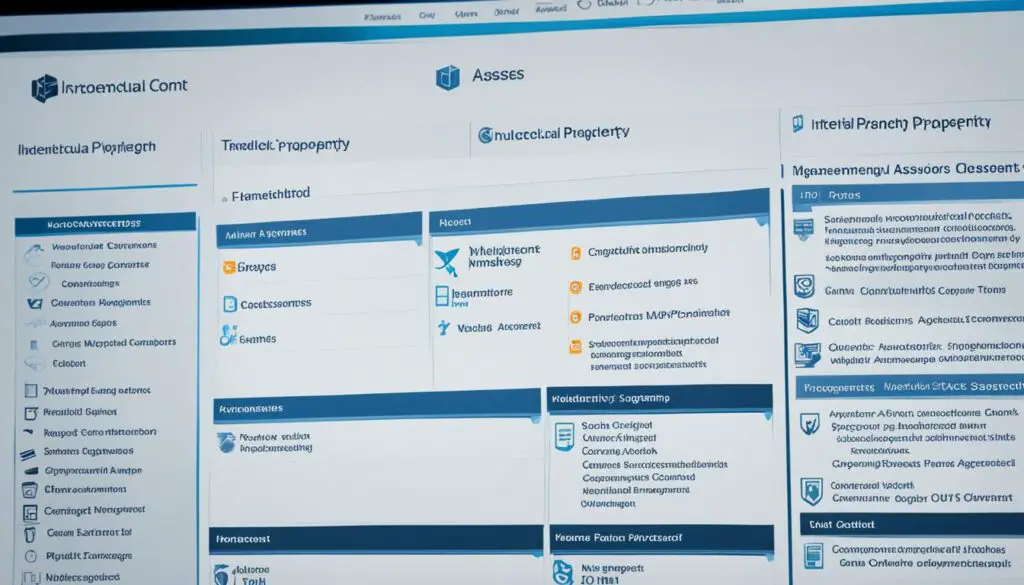
As businesses navigate the dynamic landscape of intellectual property (IP) management, the role of specialized software solutions is becoming increasingly vital. Intellectual property software is revolutionizing the way organizations protect and manage their valuable IP assets. With the growing importance of innovation security and the complex nature of IP management, businesses are turning to these software solutions to streamline processes and maximize the value of their IP portfolio.
Intellectual property software offers a wide range of benefits to organizations. It enables efficient tracking, organization, and analysis of various IP assets, including patents, trademarks, and copyrights. With advanced search and indexing capabilities, businesses can conduct comprehensive IP searches with ease. The software also facilitates licensing and monetization activities by providing a centralized platform for managing agreements and tracking royalties. Furthermore, IP portfolio analysis tools allow organizations to evaluate the performance and value of their IP assets effectively.
The key features of intellectual property software are designed to enhance productivity and efficiency. Automated document management capabilities ensure that all relevant IP documents are stored, organized, and readily accessible. Additionally, deadline tracking and docketing features keep businesses on top of crucial submission requirements. Collaboration tools foster seamless communication and knowledge sharing among IP team members. Advanced analytics and reporting capabilities provide valuable insights into IP portfolio performance and infringement risks. Integration capabilities with other software systems further enhance workflow efficiency and productivity.
The future of intellectual property software is shaped by technological advancements and emerging trends in the industry. AI and machine learning capabilities are being integrated into IP software, enabling advanced analytics, predictive modeling, and automation of routine tasks. Cybersecurity features will continue to play a vital role in protecting IP assets as their value grows and cyber threats become more sophisticated. Moreover, the globalization of business and the rise of emerging technologies such as blockchain and IoT will present new opportunities and challenges for IP management.
Embracing intellectual property software is essential for businesses looking to optimize their IP management processes and safeguard their valuable assets. By leveraging innovative solutions, organizations can foster a culture of innovation, enhance security, and gain a competitive edge in the dynamic intellectual property landscape.
Key Takeaways:
- Intellectual property software streamlines IP management processes and maximizes the value of IP assets.
- It enables efficient tracking, organization, and analysis of various IP assets, including patents, trademarks, and copyrights.
- The software simplifies licensing and monetization activities, providing a centralized platform for managing agreements and tracking royalties.
- Advanced analytics and reporting capabilities offer valuable insights into IP portfolio performance and infringement risks.
- The future of intellectual property software lies in AI and machine learning capabilities, cybersecurity features, and the integration of emerging technologies.
The Benefits of Intellectual Property Software
When it comes to managing intellectual property assets, organizations face numerous challenges. From tracking patents and trademarks to ensuring copyright compliance, effective IP management is crucial for business success. That’s where intellectual property software comes in. With its advanced features and capabilities, IP software offers a wide range of benefits for organizations seeking efficient and streamlined IP asset management.
Efficient IP Asset Management
One of the key benefits of intellectual property software is its ability to enable efficient management of IP assets. Whether it’s patents, trademarks, or copyrights, IP software provides a centralized platform that allows organizations to track, organize, and analyze their IP assets. This not only simplifies the management process but also ensures that no valuable IP assets are overlooked or underutilized.
Simplified Intellectual Property Searches
Intellectual property searches can be time-consuming and complex. However, with intellectual property software, conducting these searches becomes a breeze. The software’s advanced search and indexing capabilities allow organizations to easily locate and retrieve relevant IP information, ensuring comprehensive coverage. This saves valuable time and resources, enabling IP professionals to focus on other critical tasks.
Streamlined Licensing and Monetization
Another significant benefit of intellectual property software is its ability to facilitate licensing and monetization activities. The software provides a centralized platform for managing licensing agreements, tracking royalty payments, and ensuring compliance with licensing terms. This streamlines the entire licensing process, making it easier for organizations to leverage their IP assets and generate revenue.
IP Portfolio Analysis and Evaluation
Intellectual property software also enables organizations to perform in-depth analysis and evaluation of their IP portfolios. With features like advanced analytics and reporting, IP software allows businesses to assess the value and performance of their IP assets. This analysis helps organizations make informed decisions about IP strategy, identify potential infringement risks, and exploit licensing opportunities.
Enhanced Collaboration and Communication
Collaboration and communication are vital for effective IP management. Intellectual property software offers collaboration tools that facilitate seamless teamwork among IP professionals. This allows for efficient knowledge sharing, improved communication, and streamlined workflows. By enabling better collaboration, IP software enhances overall productivity and ensures that all stakeholders are on the same page.
To summarize, intellectual property software provides organizations with a wide range of benefits, including efficient IP asset management, simplified intellectual property searches, streamlined licensing and monetization, IP portfolio analysis, and enhanced collaboration and communication. By leveraging the capabilities of IP software, businesses can optimize their IP management strategies and unlock the full potential of their intellectual property assets.
Key Features of Intellectual Property Software
Intellectual property software offers a comprehensive set of features that are designed to enhance and streamline IP management processes. These features provide organizations with the necessary tools to effectively manage their valuable intellectual property assets. Let’s take a closer look at some of the key features:
Automated Document Management
The automated document management capabilities of intellectual property software allow organizations to efficiently store, organize, and retrieve all relevant IP documents. This feature eliminates the need for manual document handling, reducing the risk of information loss or duplication. With automated document management, users can easily access the necessary documents, enhancing collaboration and increasing productivity.
Deadline Tracking and Docketing
With the deadline tracking and docketing features, intellectual property software ensures that organizations never miss important deadlines for patent and trademark applications, renewals, and maintenance actions. This feature provides a centralized system for tracking deadlines, sending notifications, and managing critical IP-related tasks. By effectively managing deadlines, organizations can avoid costly delays and maintain the integrity of their intellectual property portfolio.
Collaboration Tools
Collaboration is essential in IP management, and intellectual property software offers robust collaboration tools to facilitate seamless communication and knowledge sharing among IP team members. These tools enable real-time collaboration, allowing team members to work together on projects, share insights, and exchange information. With collaboration tools, organizations can maximize the collective expertise of their IP teams and improve overall efficiency.
Analytics and Reporting
Intellectual property software provides advanced analytics and reporting capabilities, giving organizations valuable insights into their IP portfolio performance, infringement risks, and licensing opportunities. These features enable data-driven decision making, allowing organizations to strategically manage their intellectual property assets. By leveraging analytics and reporting, organizations can identify trends, assess the value of their IP portfolio, and make informed business decisions.
Integration Capabilities
Integration capabilities are vital for seamless data exchange and workflow integration. Intellectual property software offers integration capabilities with other software systems, enabling organizations to connect their IP management processes with other critical business functions. This integration enhances efficiency and productivity by eliminating manual data entry, reducing errors, and streamlining workflows.
| Key Features | Description |
|---|---|
| Automated Document Management | Efficiently store, organize, and retrieve IP documents |
| Deadline Tracking and Docketing | Ensure timely submission of patent and trademark applications |
| Collaboration Tools | Facilitate seamless communication and knowledge sharing |
| Analytics and Reporting | Provide valuable insights into IP portfolio performance |
| Integration Capabilities | Seamless data exchange and workflow integration |
The key features of intellectual property software enable organizations to optimize their IP management processes, enhance collaboration, and gain a competitive edge in the dynamic intellectual property landscape. By leveraging these features, businesses can effectively protect and maximize the value of their intellectual property assets.
The Future of Intellectual Property Software
The future of intellectual property (IP) software looks promising as advancements in technology continue to shape the industry. With the integration of artificial intelligence (AI) and machine learning capabilities into IP software, organizations can benefit from advanced analytics, predictive modeling, and automation of routine tasks. This not only increases efficiency but also enhances decision-making processes and enables businesses to extract valuable insights from their IP assets.
As the value of intellectual property increases, so does the importance of cybersecurity. In response to the rising number of cyber threats, IP software is incorporating robust cybersecurity features to safeguard valuable assets. These features protect against unauthorized access, data breaches, and intellectual property theft, ensuring that businesses can maintain the integrity of their IP portfolio and prevent potential reputational and financial damages.
The globalization of business and the emergence of new technologies such as blockchain and the Internet of Things (IoT) are also influencing the future of IP software. As companies expand their operations globally, IP software is being designed to support cross-border collaboration, facilitate international IP filings, and address the unique challenges associated with managing IP rights in different jurisdictions. The integration of blockchain technology can provide a secure and transparent platform for IP registration, licensing, and enforcement, while IoT offers new avenues for monitoring and protecting IP assets in the digital realm.
In conclusion, the future of intellectual property software is driven by AI and machine learning, automation, cybersecurity, globalization, and emerging technologies. As these trends continue to shape the industry, businesses can expect IP software to evolve and adapt to meet their changing needs. By leveraging the power of advanced technologies, organizations can effectively protect, manage, and monetize their intellectual property assets, gaining a competitive edge in an increasingly dynamic and interconnected global marketplace.
FAQ
What is intellectual property software?
Intellectual property software is a specialized software solution that helps organizations manage their intellectual property assets, such as patents, trademarks, and copyrights. It enables efficient tracking, organization, and analysis of these assets, allowing businesses to streamline their IP management processes.
How does intellectual property software benefit organizations?
Intellectual property software offers several benefits to organizations. It simplifies intellectual property searches, enables licensing and monetization activities, facilitates IP portfolio analysis, and provides valuable insights into the value and performance of intellectual property assets. Additionally, it helps with document management, deadline tracking, collaboration, analytics, reporting, and integration with other software systems.
Will intellectual property software evolve in the future?
Yes, intellectual property software will continue to evolve to meet the changing needs of businesses in the dynamic intellectual property landscape. Advancements in technology, such as artificial intelligence and machine learning, will enable advanced analytics and automation. Cybersecurity features will play a crucial role in protecting IP assets, and the globalization of business and emerging technologies like blockchain and IoT will shape the future of intellectual property software.









